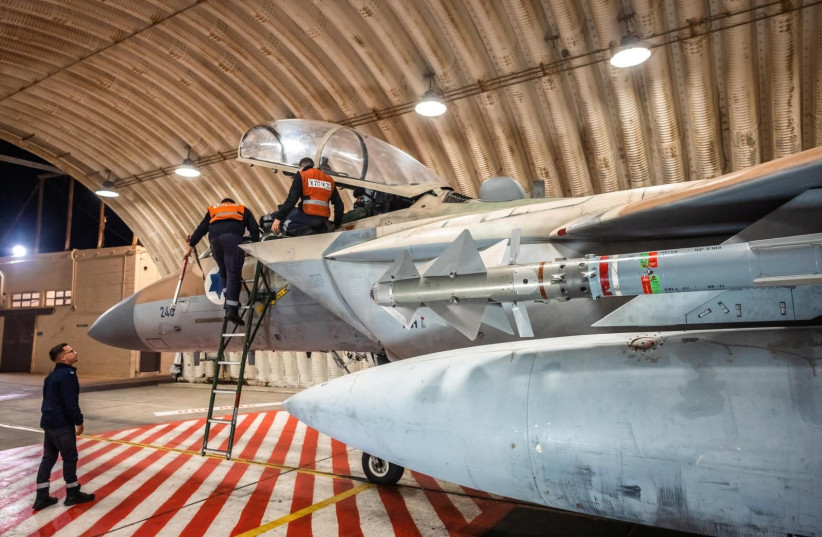“Iran’s response to this crime of the Zionist regime will be definitive and there is no doubt about it.”
MATHILDA HELLER
AUGUST 11, 2024 02:09Updated: AUGUST 11, 2024 05:54

Iran’s Defense Minister Brigadier General Mohammad-Reza Ashtiani walks near an Iranian missile during an unveiling ceremony in Tehran, Iran, in this picture obtained on February 17, 2024.(photo credit: Iran’s Defense Ministry/WANA (West Asia News Agency)/Handout via REUTERS)”Iran’s aerial operations against Israel could last three to four days,” said Ahmad Bakhshayesh Ardestani, a member of the Iranian Parliament’s National Security Commission, Iran International reported on Saturday night, citing an interview published by ‘Iran Watch.’
Ardestani reportedly told Iran Watch that Iran “is certainly prepared for the consequences of such an attack and will be ready for any subsequent developments.” He added that the Iranian response would “be carried out by surprise and may even last three to four days.”
He told the interviewer that “bloodshed would be carried out” to avenge Hamas leader Ismail Haniyeh, who was killed in Tehran while attending the inauguration of new Iranian president Pezeshkian.
“Therefore, Iran’s response to this crime of the Zionist regime will be definitive and there is no doubt about it.”
Ardestani also told Iran Watch that prolonging the response, or making Israel wait for the response, was in Iran’s favor as Israel “feels every night that it is in limbo, and keeping Israel in limbo is part of the revenge operation.”
“Adopting a policy of patience and waiting is part of the revenge process of the Islamic Republic.”

Crews work on an Israeli Air Force F-15 Eagle in a hangar, said to be following an interception mission of an Iranian drone and missile attack on Israel, in this handout image released April 14, 2024. (credit: Israel Defense Forces/Handout via REUTERS)
Many experts have claimed that psychological warfare is part of Iranian strategy. David Menashri, an Iran expert at Tel Aviv University, told The Media Line “Israel is not that good at the game of patience like Iran, so it will be interesting to see if it will act first. Iran is clearly winning the psychological warfare at the moment.”
Ardestani did however confirm to Iran Watch that Iran would respond when “appropriate” but that it must happen “by surprise.”
Israel-Hamas negotiations
Referring to claims by Iran’s mission to the UN on Friday that Tehran would honor any Gaza ceasefire and hostage deal accepted by Hamas, and therefore may refrain from attacking, Ardestani said that this would indeed be the only situation in which Iran would not retaliate. However, he added that the state of negotiations between the two sides showed “that it is unlikely that the two sides will reach such an agreement in the future, and for this reason, the Islamic Republic will not let go of the bloodshed of Martyr Haniyeh.”
When asked if the attack would be similar in nature to “Operation True Promise” – the name given by Iran to the drone and missile attack on Israel in April – Ardestani said that it might be similar, but of a greater scale.
“In the previous phase, about 300 drones and missiles were fired at the occupied territories, and this time, the number of projectiles may increase to, for example, about 600 war projectiles.”
Ardestani also alluded to the potential joint involvement of Iranian proxies in an attack on Israel, potentially Hezbollah in Lebanon. “This time, like the previous time, the resistance groups of the region will definitely accompany the Islamic Republic in providing its response,” he added.
April attack
Speaking on the April drone attack, Ardestani stated that the then-intention was not to “escalate tension in the region” but to “prove to America that Iran was capable of penetrating the protection umbrella created over [Israel] and entering the territory.”
However, he claimed that, unlike the previous attack in which the US was notified before it occurred, “this time we will definitely not inform the enemy.”
Regarding the coalition of countries which took part in intercepting aerial threats in April, such as Jordan, Ardestani said it was “unfortunate” that these nations “defended the Zionist regime under the pretext of defending their airspace.”
He also seemingly threatened the countries by saying that if Israel chooses to attack Iran with missiles or jets using the skies of these countries (with permission), then this would “create a challenge for those countries.”
Western diplomats told KAN on Monday that such a coalition would be possible to restore the regional coalition should Iran attack again.
Speaking on the assassination of Haniyeh, Ardestani told Iran Watch that the Intelligence Ministry in Iran believed no infiltration took place, seemingly referring to claims that IRGC agents were hired by Israel to plant the explosives. However, he said his “personal analysis was that, considering the circumstances that occurred in this assassination, infiltration must have played a role in it.”
Iran Watch – or Didban Iran – is a Iranian news site edited by journalist Saeed Seif-Ali, according to Committee to Protect Journalists. Seif-Ali was arrested along with other journalists during the Mahsa Amini protests in 2022.
Content retrieved from: https://www.jpost.com/breaking-news/article-814169#814169.